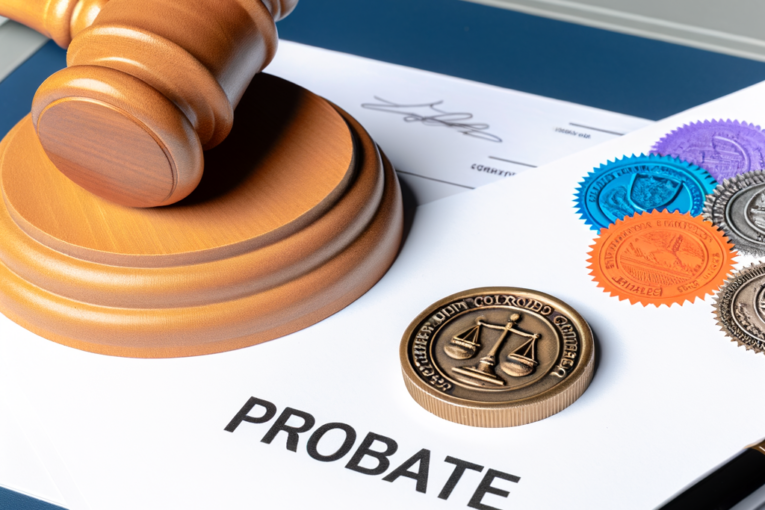Life is full of changes. Getting married, having children, retiring, or experiencing the loss of a loved one all require adjusting your estate plan. An up-to-date estate plan ensures your wishes are fulfilled and your family is provided for when you pass away.
What is estate planning, and why is it important?
Estate planning is the process of arranging for the transfer of your assets and property to chosen beneficiaries after you pass away or if you become incapacitated. A comprehensive estate plan helps build your legacy and secure the future for those you care about.
Here are some of the key benefits of estate planning:
- Prevents disputes: A clear estate plan minimizes confusion and disputes between heirs over asset distribution.
- Secures assets: Your possessions are distributed as you wish rather than by rigid state laws.
- Organized asset transfer: assets can be transferred immediately to beneficiaries upon death.
- Tax planning: strategies can reduce estate taxes so more assets transfer to heirs.
- Child protection: guardianship and trusts provide for minor children.
Estate planning is important for anyone who wants to protect and provide for their loved ones with their legacy. It gives you control over what happens to your assets when you pass away.
Without an estate plan, your assets may be distributed according to inflexible state intestacy laws rather than your wishes. The court also decides who will care for any minor children you have, which may not be someone you would choose.
Estate Planning Documents
Here are some of the key legal documents included in an estate plan:
- Last Will and Testament: Outline your wishes for distributing assets and nominate an executor to oversee the process.
- Durable Power of Attorney: Grants someone authority to handle finances and legal decisions if they’re incapacitated.
- Healthcare Power of Attorney: Allows someone to make medical choices if they’re unable to do so.
- Living Will: Provides instructions for end-of-life medical treatment preferences.
- Trusts: outline asset distribution and name a trustee to manage assets for beneficiaries.
- Guardianship Declaration: Nominates guardians to care for minor children.
An estate planning attorney can help prepare these customized legal documents to match your specific circumstances and wishes.
Major life events requiring estate plan updates
It’s essential to review and update your estate plan any time there’s a major life event. Here are some key times to update your documents:
Marriage and divorce
- Marriage: Update documents to include your new spouse for inheritance, medical decisions, etc.
- Divorce: Remove your ex-spouse from all estate planning roles and redistribute assets.
Children
- New child: name guardians, create a trust, and designate inheritance.
- Child turns 18: Update documents as your child becomes a legal adult.
Death of a Loved One
- Loved one passes: Appoint new executors, beneficiaries, trustees, or guardians to fill the vacancy.
Assets and liabilities
- Asset increase or decrease: adjust planning when assets and debts change.
- Retirement: shift investment strategies and asset distribution.
- Moving: Update documents and executors based on your new state laws.
Health Changes
- Disability: Update documents to address any special needs.
- Serious illness: add or modify healthcare directives.
- Mental decline: Provide guidance for handling finances and healthcare if you become incapacitated.
Business Changes
- Starting a business: Include business assets and succession planning.
- Selling a business: Adjust planning for changes in assets.
- Business partner death: plan for redistribution of ownership
Effective estate planning strategies
Here are some tips for keeping your estate plan optimized:
- Review regularly. Revisit your documents at least annually or with major life events.
- Name guardians: Select short-term and long-term guardians for minor children.
- Pick an executor. Choose a reliable person to oversee your affairs upon death.
- Update beneficiaries: Keep beneficiaries current as relationships and needs evolve.
- Create a trust. This avoids probate and provides asset protection for heirs.
- Discuss plans. Have open conversations with family about your plans.
- Automate changes: Use IT tools to automatically update documents.
- Get professional support. Work with an estate planning attorney for optimal planning.
- Store documents safely. Keep the originals in a fireproof safe or bank deposit box.
- Share the location of documents; ensure executors and trustees can access them.
Tax Considerations in Estate Planning
Taxes can take a significant portion of an estate’s value. Strategically minimizing taxes leaves more assets to heirs and causes. Here are key estate tax planning considerations:
- Federal and state laws: Understand federal and your state’s estate tax laws. Some states have much lower exclusion amounts than the federal limit.
- Maximize deductions: Charitable and marital deductions effectively reduce estate tax liability.
- Gift tax planning: lifetime gifts up to annual exclusion limits reduce future estate taxes.
- Use trusts. Trust assets aren’t included in your taxable estate.
- Review annually. Adjust planning as tax laws frequently change.
- Utilize portability: maximize the use of any leftover exemption from a deceased spouse.
- Buy life insurance; it provides liquidity to pay estate taxes if needed.
- DIY planning limitations: Strategies like GRATs require attorney expertise.
An experienced estate planning attorney can create customized strategies to minimize your tax liability.
Selecting Your Estate Planning Team
Carefully choosing professionals to assist with your estate planning is key to success. Look for these qualities when selecting:
Estate planning attorney
- Specialization: Select an attorney who focuses specifically on estate planning.
- Experience: Ask about years of practice and the number of plans created.
- Reputation: Read reviews and ask for references to verify the quality of service.
- Personality fit: Choose an attorney you feel comfortable talking with openly.
- Cost: Fees can vary greatly, so compare rates.
- Ongoing support: Some attorneys act as lifetime family advisors.
Financial Planner
- Qualifications: Look for CFPS, CFP, ChFC, or CPA/PFS credentials.
- Process: Do they take a goals-based planning approach?
- Services: Offer estate plan reviews and coordination.
- Fees: They typically charge hourly, retainer, or AUM fees.
Accountant
- Specialization: Seek a CPA specializing in estate and trust taxes.
- Responsive: Are they quick to return calls and emails?
- Proactive: Will they suggest tax planning strategies?
- Price: Understand their hourly rate structure.
Take time to research and thoughtfully choose an estate planning team you trust.
Conclusion
Major life events require revisiting your estate plan to realign it with your evolving needs and goals. Updating beneficiaries, asset distribution, and heirs keeps your legacy secure.
Partnering with an expert estate planning attorney provides guidance on maximizing the value transferred to your family and what you care about. Through strategic tax planning and a customized approach, they can help craft an estate plan you can feel confident in.
With a little time and guidance, you can revamp your estate plan to provide for your loved ones long into the future.





